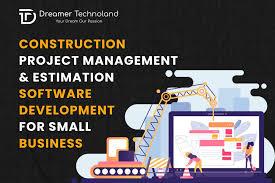Estimating construction costs accurately is one of the biggest challenges contractors and builders face. Manual spreadsheets and paper-based estimates often lead to errors, inefficiencies, and cost overruns. Today, modern digital tools — especially construction management software and advanced construction estimating software — have transformed the way contractors plan, bid, and execute projects.
These digital solutions not only save time but also provide a competitive edge by improving accuracy, transparency, and collaboration. Let’s explore how you can estimate construction costs more effectively using digital technology.

The Need for Accurate Construction Cost Estimation
Every successful construction project begins with a precise cost estimate. Whether you’re building residential homes, commercial spaces, or large infrastructure projects, estimating materials, labor, and overheads correctly ensures profitability and client satisfaction.
Traditional methods often rely on manual calculations or outdated templates. However, as projects grow in complexity, these methods fall short. This is where estimating software for construction becomes indispensable — helping businesses streamline their budgeting, forecasting, and project management processes.
What Is Construction Estimating Software?
Understanding the Role of Estimation Tools
Construction estimating software is a digital solution that automates and simplifies cost estimation for contractors, builders, and project managers. It allows users to input project details such as materials, labor rates, equipment costs, and subcontractor bids — generating accurate and consistent estimates in minutes.
Modern tools integrate with construction management software, creating a unified workflow that connects estimation, scheduling, procurement, and billing.
How Digital Tools Improve Cost Estimation Accuracy
1. Real-Time Data and Cost Libraries
With advanced cloud estimating software, contractors can access updated pricing databases, supplier catalogs, and regional cost indexes. This ensures that material and labor estimates are always accurate and reflect current market rates.
By using centralized cost libraries, businesses can reduce human error and maintain consistency across multiple projects.
2. Faster and More Efficient Workflows
Manual estimation often consumes days or weeks. Digital construction estimating software automates repetitive tasks like quantity takeoffs, bid comparisons, and cost aggregation.
Contractors can generate detailed reports and proposals faster, helping them respond to bid requests quickly and improve project turnaround times.
3. Integration with Project Management and Accounting Tools
Advanced construction management software allows smooth integration between estimation, scheduling, procurement, and financial systems.
This means your cost estimates automatically flow into project budgets, timelines, and accounting modules — ensuring financial accuracy and better control throughout the project lifecycle.
4. Better Collaboration with Subcontractors
Effective communication with subcontractors is crucial for large projects. Using subcontractor estimating software, general contractors can invite subs to submit bids, compare estimates, and choose the most cost-effective options — all within a single platform.
This collaborative environment helps reduce confusion, duplication, and last-minute surprises.
Choosing the Right Construction Estimating Software for Your Business
1. Cloud-Based vs. Desktop Solutions
Modern contractors are moving toward cloud estimating software due to its accessibility and flexibility. Cloud solutions allow teams to collaborate in real-time, whether they’re in the office or on-site.
In contrast, desktop tools may offer better performance for single users but lack the scalability required for growing businesses.
2. Features That Matter
When selecting the right construction estimating software for small business, focus on essential features such as:
- Real-time cost databases
- Automated takeoff tools
- Integration with accounting and project management systems
- Multi-user collaboration
- Custom report generation
These features ensure the software grows with your business and continues to deliver value long-term.
3. Scalability for Specialized Projects
Different types of projects require unique estimating tools. For example, home construction cost estimating software helps homeowners and small contractors manage residential budgets effectively, while renovation estimating software and residential remodeling estimating software are ideal for builders focusing on renovation or refurbishment projects.
For enterprises managing multiple subcontractors and large-scale developments, smart estimating software ensures speed, accuracy, and automation at scale.
How Digital Estimation Tools Support Business Growth
1. Reduced Errors and Risk
Human errors in estimation can lead to major financial losses. Digital tools minimize manual entry, ensure accuracy, and flag inconsistencies automatically — helping contractors make data-driven decisions.
2. Profit Margins
Accurate estimates reduce material waste, prevent cost overruns, and enable precise bidding. This directly improves profitability and competitiveness in a crowded market.
3. Enhanced Transparency and Client Confidence
Clients appreciate transparency in project pricing. With professional construction estimating software, contractors can provide itemized estimates that clearly outline costs for labor, materials, and overheads. This transparency builds trust and strengthens client relationships.
The Future of Construction Cost Estimation
As the construction industry embraces digital transformation, tools like AI-driven smart estimating software are becoming more advanced. These systems use predictive analytics and machine learning to forecast potential cost fluctuations and resource requirements before the project begins.
By combining automation, cloud computing, and real-time analytics, contractors can eliminate guesswork and achieve unparalleled efficiency in cost management.
Conclusion
Accurate cost estimation is the foundation of every successful construction project. Investing in construction management software and specialized estimating software for construction enables contractors to improve precision, reduce errors, and manage projects efficiently from start to finish.
Whether you’re a small builder or a large enterprise, digital solutions like subcontractor estimating software and cloud estimating software empower you to stay competitive in today’s fast-paced industry.
At Dreamer Technoland, we specialize in building customized construction estimating software that fits your business model perfectly. From residential builders to large contractors, our digital tools simplify cost estimation and drive smarter, more profitable decisions.
Related Article:
Enhancing Ecommerce Apps with AR Product Visualization
What Are The Main Types of Data Analytics and How Do They Work?
Data Visualization in Marketing Campaign Performance Tracking
Role of Voice & Gesture Interfaces in Custom Mobile Application Development Services
Financial Reporting and Accounting in Property Management Software



